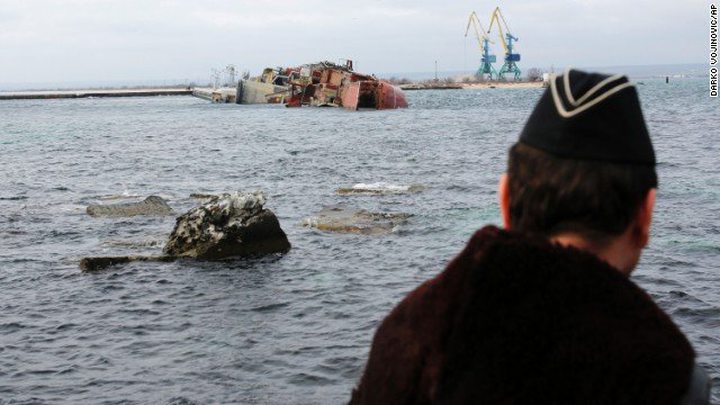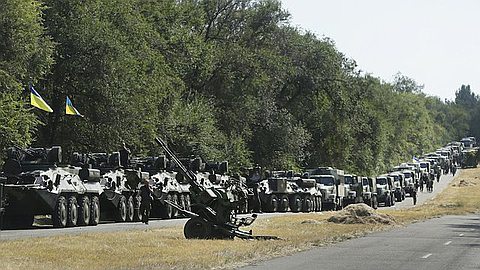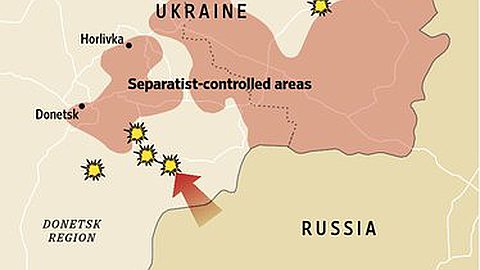Tough Words from Russia as Standoff in Ukraine's Crimea Region Continues

decommissioned Russian vessel Ochakov from the Black Sea shore outside the town of Myrnyi, Ukraine
The men -- who are equipped with automatic weapons -- say they belong to the Crimean self-defense forces, said Vladislav Seleznyov, head of the Ministry of Defense's media office, on his Facebook page.
They have stationed armed men on each floor of the military registration office, he said.
It comes a day after pro-Russian troops reportedly tried to smash open the gates of a Ukrainian base in Crimea.
Russia's navy also blockaded Ukrainian ships Friday. And armed men refused to allow military observers from the Organization for Security and Co-operation in Europe to enter the Crimea region.
The crisis in Crimea began about a week ago, when pro-Russian troops fanned out calmly, many of them with no ammunition in their rifles, and took effective control of the region.
Since then, tensions have flared between Moscow and Kiev over control of the Black Sea peninsula, while the world's diplomats have urged that conflict be avoided.
On Saturday, Moscow accused the OSCE, a regional advisory group, of hypocrisy.
First, condemn violence by demonstrators in Kiev that led to the ouster of Ukraine's former President Viktor Yanukovych, the foreign ministry said, according to a report in state-run news agency RIA Novosti.
Then talk about Crimea.
"Some OSCE members and executive bodies have acted in the worst traditions of double standards while dealing with the situation in Ukraine," the ministry reportedly said.
Russian demands
Russian Foreign Minister Sergey Lavrov, speaking Saturday, insisted Russia was not militarily involved in the standoff in Crimea.
"We are ready to continue dialogue, with the understanding that the dialogue will be honest and a partnership, and without attempts to cast us as a party to the conflict -- which is what a few of our partners are trying to do now. This crisis was not created by us," he said.
That dialogue might not include Ukraine's new interim government, whom Lavrov criticized.
"The current government is dependent on the radical nationalists who seized the power," he said. "Even our Western partners know what they are like. They visit Ukraine often. But they try to hide the facts."
The aim of dialog would be the implementation of a deal agreed upon on February 21, Lavrov said, when Yanukovych was still in power. This envisaged fresh elections, constitutional reform and the disbanding of illegal armed groups.
"It would be better for our Western partners to turn their enthusiasm to these goals, instead of calling for Russia and Ukraine to settle this crisis," he said.
The interim government was voted in by a large majority in Ukraine's parliament, including members of Yanukovych's own Party of Regions, after he fled the country for Russia following bloody street protests. Protesters were angry over his rebuff of a trade deal with the European Union in favor of one with Russia.
Observers seek entry to Crimea
Ukrainian Acting Foreign Minister Andrii Deshchytsia urged Moscow Saturday to pursue diplomacy, not violence.
"We cannot afford to let anybody die in this conflict," he said.
Ukraine will continue down a diplomatic path, he said, and will not respond to Russian "provocations."
He urged Russia not to block international organizations like the OSCE and United Nations from sending observers into Crimea.
Delegates from the OSCE will attempt to cross into Crimea for a third day Saturday, said a representative traveling with the convoy from the southern Ukrainian city of Kherson.
The unarmed international military observers were turned away by pro-Russian forces at a checkpoint at Chongar on Friday.
Russia says the armed men who've taken control of key sites in Crimea are local self-defense forces.
Crimea, a self-governing region in southern Ukraine with an ethnic Russian majority and strong cultural ties to Russia, has become the epicenter of a battle for influence between Moscow, Kiev and the West since Yanukovych was pushed out of office.
Crimean threat?
Ukrainian troops at the Crimean base reportedly besieged Friday by pro-Russian troops refused to surrender and barricaded themselves inside a control room, said Vitaly Onishenko, a deputy commander at the base, located near Sevastopol.
Outside the base, self-styled Crimean defense forces, similar to local militias, attacked journalists, he said. At least one person, believed to be a journalist, was injured and taken to a hospital, he said.
The standoff at the base eventually ended with the Russian-speaking forces pulling back to the outside of the base.
And in signs that the pro-Russian Crimean authorities are clamping down on dissent within the peninsula, at least two Ukrainian channels, 1+1 and Channel 5, have been blocked from broadcasting terrestrially.
Russia's Foreign Ministry in turn claimed that Russian journalists from TV Centre and Vesti were barred entry to the country at Donetsk airport in eastern Ukraine. It accused Kiev of "a flagrant act of discrimination against the freedom of the press."
The standoff has prompted neighboring countries and their allies to boost military defenses, with the United States beefing up its number of fighter jets in Lithuania and Poland.
The USS Truxton, a guided-missile destroyer, was also heading to the Black Sea to join in pre-planned military exercises with Romanian and Bulgarian forces.
Political moves
Russia's Parliament on Friday gave its defiant support to Crimean lawmakers who want to see their region split from Ukraine and join Russia.
The Crimean lawmakers' unanimous call for a public vote on separation, to be held on March 16, prompted howls of outrage in the United States and Europe and the threat of sanctions, including asset freezes, visa bans and travel bans.
The government in Kiev has told local officials to stand down on further steps towards a referendum, and interim Prime Minister Arseniy Yatsenyuk condemned talk of a split.
Russia has denounced Yanukovych's ouster as an illegitimate coup, and Russian President Vladimir Putin has refused to recognize the new Ukrainian authorities.
He has insisted he has the right to use military force in Ukraine if necessary to protect ethnic Russians in Crimea.
But Ukrainian officials say no threat exists, and Putin is using it as a pretext to control the region.
Russian speakers make up about 60% of Crimea's population of more than 2 million, but around a quarter are Ukrainian and 12% are Crimean Tatar, a predominately Muslim minority. Neither of the latter two groups would welcome a switch to Russian control.
U.S. President Barack Obama has proposed a potential solution to Putin that would include direct talks between Kiev and Moscow and the replacement of Russian forces with international monitors to protect the rights of ethnic Russians.
Asset freezes, visa bans
Meanwhile, as the West seeks to put the diplomatic squeeze on Russia, European Union nations said they'll suspend some talks with Russia and have threatened travel bans, asset freezes and the cancellation of a planned EU-Russia summit.
Lavrov warned against sanctions, saying in a statement that they would "inevitably boomerang" on the United States.
The West has also offered financial support to the fledgling government in Kiev.
Ukraine's new government and the EU have agreed to revive a trade deal and an aid package that could bring $15 million to Ukraine.
Such aid is desperately needed.
Russian energy giant Gazprom has not received any payment from Ukraine in February -- and cannot supply natural gas for free, the company's CEO Alexey Miller said, according to Russian state news agency Itar-Tass.
If Gazprom cut off gas supplies to Ukraine, as it did during a dispute in 2009, then European nations could also suffer shortages, since major gas pipelines pass through Ukraine on their way from Russia to Europe.






